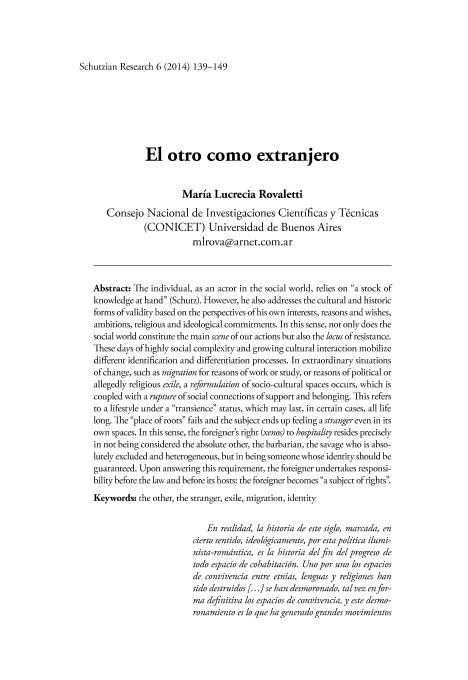Mostrar el registro sencillo del ítem
dc.contributor.author
Rovaletti, Maria Lucrecia

dc.date.available
2018-06-22T21:54:33Z
dc.date.issued
2014-12
dc.identifier.citation
Rovaletti, Maria Lucrecia; El otro como extranjero; Zeta Boooks; Schutzian Research; 6; 12-2014; 139-149
dc.identifier.issn
2067-0621
dc.identifier.uri
http://hdl.handle.net/11336/49840
dc.description.abstract
El individuo, como actor en el mundo social, dispone de un "acervo de conocimientos a mano" (Schutz). Sin embargo, también interpela las formas culturales e históricas de validez dadas según las perspectivas de sus particulares intereses, motivos y deseos, aspiraciones, compromisos religiosos e ideológicos. En este sentido, el mundo social no sólo constituye la escena primordial de nuestras acciones sino también el locus de resistencias. Nuestra época de elevada complejidad social y de creciente interacción cultural, moviliza además distintos procesos de identificación y diferenciación. En situaciones extraordinarias de cambio, como las de migración por causas laborales o de estudio, o las de exilio por razones políticas o supuestamente religiosas, se produce una re-formulación de espacios socio-culturales a los que se sobreañade la ruptura de las redes sociales de apoyo y pertenencia. Se trata de un modo de vida en estado de ?transitoriedad?, que pueda durar en ciertas ocasiones toda la vida. Falla el ?territorio de enraizamiento? y el sujeto acaba sintiéndose extraño hasta en sus propios espacios. En este sentido, el derecho del extranjero (xenos) a la hospitalidad reside precisamente en no ser considerado el otro absoluto, el bárbaro, el salvaje absolutamente excluido y heterogéneo, a ser alguien a quien hay que garantizarle su identidad. Al responder a este pedido, se hace responsable ante la ley y ante tus anfitriones: deviene ?un sujeto de derecho?.
dc.description.abstract
The individual, as an actor in the social world, relies on “a stock of knowledge at hand” (Schutz). However, he also addresses the cultural and historic forms of validity based on the perspectives of his own interests, reasons and wishes, ambitions, religious and ideological commitments. In this sense, not only does the social world constitute the main scene of our actions but also the locus of resistance. These days of highly social complexity and growing cultural interaction mobilize different identification and differentiation processes. In extraordinary situations of change, such as migration for reasons of work or study, or reasons of political or allegedly religious exile, a reformulation of socio-cultural spaces occurs, which is coupled with a rupture of social connections of support and belonging. This refers to a lifestyle under a “transience” status, which may last, in certain cases, all life long. The “place of roots” fails and the subject ends up feeling a stranger even in its own spaces. In this sense, the foreigner’s right (xenos) to hospitality resides precisely in not being considered the absolute other, the barbarian, the savage who is absolutely excluded and heterogeneous, but in being someone whose identity should be guaranteed. Upon answering this requirement, the foreigner undertakes responsibility before the law and before its hosts: the foreigner becomes “a subject of rights”.
dc.format
application/pdf
dc.language.iso
spa
dc.publisher
Zeta Boooks
dc.rights
info:eu-repo/semantics/openAccess
dc.rights.uri
https://creativecommons.org/licenses/by-nc-sa/2.5/ar/
dc.subject
Etica Aplicada
dc.subject
Transdiciplinariedad
dc.subject
Campo
dc.subject.classification
Ciencias Sociales Interdisciplinarias

dc.subject.classification
Otras Ciencias Sociales

dc.subject.classification
CIENCIAS SOCIALES

dc.title
El otro como extranjero
dc.type
info:eu-repo/semantics/article
dc.type
info:ar-repo/semantics/artículo
dc.type
info:eu-repo/semantics/publishedVersion
dc.date.updated
2018-06-22T15:50:56Z
dc.journal.number
6
dc.journal.pagination
139-149
dc.journal.pais
Rumania

dc.journal.ciudad
Bucarest
dc.description.fil
Fil: Rovaletti, Maria Lucrecia. Consejo Nacional de Investigaciones Científicas y Técnicas; Argentina. Universidad de Buenos Aires; Argentina
dc.journal.title
Schutzian Research
dc.relation.alternativeid
info:eu-repo/semantics/altIdentifier/url/https://www.pdcnet.org//pdc/bvdb.nsf/purchase?openform&fp=schutz&id=schutz_2014_0006_0139_0149&onlyautologin=true
Archivos asociados
